A guide to Data Bearing Devices/Assets. Download your free copy here >
Selection criteria for logistics service providers (LSPs) and transporting your IT assets
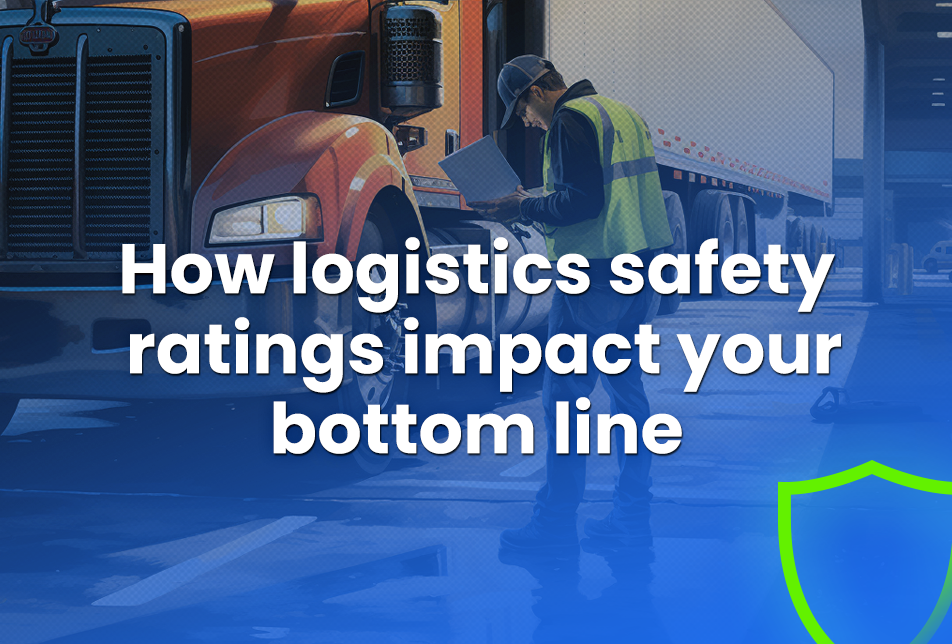
When you’re evaluating a new IT logistics provider, what criteria are you using? If you need white glove packing, chain of custody, serial number capturing, and secure transport for high-value assets, examining these capabilities is essential.
Cost is always a factor. Then maybe you’ll evaluate delivery metrics like tracked shipping time, order accuracy and scheduled pick-ups and most importantly, the damages and claims ratio.
When was the last time you considered FMCSA’s OOS, ISS and CSA safety scores as an evaluation metric for your logistics partnership?
Yes, safety.
Mandated safety for logistics service providers (LSPs) … so long Smokey and the Bandit

Gone are the days of convoys, outlaw trucking and CB radios. Today, road and operational safety for all commercial fleets (including Guardian’s logistics and shred truck fleet) is regulated and diligently monitored by the Department of Transportation’s (DOT) Federal Motor Carrier Safety Administration (FMCSA). The FMCSA’s mandate is to reduce crashes, injuries and fatalities caused by large commercial vehicles.
With FMCSA’s lengthy roster of acronyms such as CSA, ISS, SMS, SFD, OOS and HOS, we certainly don’t expect our customers to be familiar with the breadth and depth of federal regulatory safety.
But, what is essential is that our customers, ITADs, VARs and MSPs, are confident that Guardian drivers and trucks understand the importance that we place on safety practices, and that we are proactive and diligent about the safe and secure transport of their customer’s IT assets.
There’s costly fallout from poor safety scores
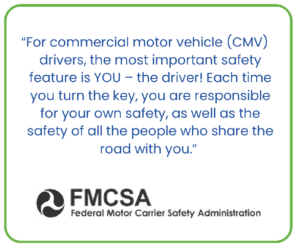
As a NAID AAA Certified company, all Guardian Data Destruction technicians and drivers are trained in secure data handling.
Safe vehicles and truck handling are equally important. When it comes to moving high-value IT equipment and secure transport from one location to another, safety is a weighty factor that’s often overlooked.
That’s why fleet carrier safety Compliance, Safety, Accountability (CSA) scores are public. As a buyer of services that involve the transportation of your equipment and data, you can evaluate the risk of working with carriers with federally registered low safety records. High CSA scores resulting from multiple safety violations from both driving and truck maintenance add cost, cause delays, increase driver turnover and impact productivity. All of these factors add risk to projects that depend on secure transport and chain of custody.
Spoiler alert: Guardian’s logistics track record
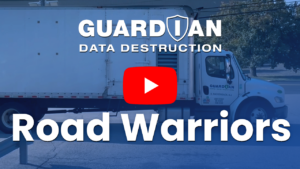
Drum roll, please!
The Guardian fleet, currently at 28 trucks spread from coast to coast, and our valued CDL drivers uphold the Guardian reputation for best-in-class performance based on our Core Values and Mission.
| CSA Scores | |
|---|---|
| Federal Safety (ISS) Inspection Score | 29 (low – no inspection required) |
| Federal Safety (ISS) Recommendation | Pass (safest level) |
| Vehicle Out of Service (OOS) Rate | 3.7% (national avg 21.4%) |
| Driver Out of Service (OOS) Rate | 2.5% (national avg 6%) |
| Safety Fitness Determination (SFD) | Satisfactory (safest level) |
The transportation safety terms and acronyms in the chart above are explained in detail below. If you have any questions (and don’t want to read), please contact us here.
Commercial logistics – the safety bar is set high
As a national packing and logistics company specializing in securely transporting IT assets from anywhere to anywhere, it’s imperative that our drivers understand and follow safety requirements that are mandated by the federal government and Guardian Data Destruction. With the busiest season for IT asset disposition starting in October, all Guardian drivers, techs and their managers have just completed refresher safety training to prepare for demanding days, long weeks and inclement weather.
An overview of the Department of Transportation’s safety evaluation program:
FMCSA
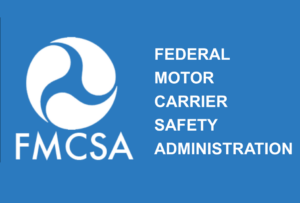
The Department of Transportation’s (DOT) Federal Motor Carrier Safety Administration (FMCSA) was established in 2000 to reduce crashes, injuries and fatalities involving commercial motor vehicles (CMV). The FMCSA is in charge of:
- Standards for Commercial Drivers’ Licenses (CDL)
- Safety data collection, analysis and action
- Regulatory Compliance and Enforcement
- Education
- State assistance for roadside inspections and safety
- Research and Technology for safety improvement
Compliance, Safety, Accountability Program (CSA)
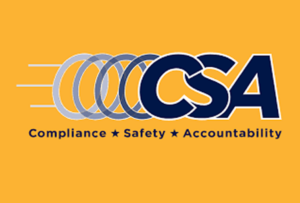
The FMCSA’s (CSA) program is a data-driven program that holds all commercial carriers and drivers accountable for highway safety. It is composed of three core components:
- Measurement – Safety Measurement System (SMS)
- Intervention – Safety Interventions Process
- Evaluation – Safety Fitness Determination (SFD)
Safety Measurement System (SMS)
The CSA is updated monthly via the Safety Measurement System (SMS) which is a database of driver CSA roadside inspections, violations, reports and investigations over a two-year period. The infractions, which carry points, are organized into seven Behavior Analysis and Safety Improvement Categories (BASICs). Driver scores are also passed on to their carrier resulting in a carrier CSA Score. Significant BASIC infractions can flag a carrier for interventions.

Inspection Selection System (ISS)

The FMCSA’s ISS score is calculated from the BASIC percentages recorded in the SMS. A high ISS score is what an inspection station (or officer) uses to quickly determine if a truck should be pulled in for an inspection. The higher the score (a result of a high number of BASIC violations), the higher the likelihood of a truck inspection.
Out-of-service (OOS) Rate

Car drivers might be pulled over and cited for a non-working turn signal, no insurance or an invalid driver’s license. The same is true for commercial trucks. Roadside inspections that turn up a high frequency of safety violations for either the vehicle or the driver (out-of-service criteria) result in mandatory inactive status. A carrier’s out-of-service frequencies for drivers and trucks are their OOS rates and are available to the public as part of a carrier’s DOT SAFER profile.
Safety Fitness Determination (SFD)
After an onsite investigation of safety violations, a dated Safety Fitness Determination (SFD) is issued noting compliance with FMCSA standard 49 CFR Part 385. The possible safety ratings are Satisfactory, Conditional (inadequate) and Unsatisfactory (inadequate and in violation).
Hours of Service (HOS) Regulations

The FMCSA regulates the driver time and rest periods which are collectively titled Hours of Service (HOS). The HOS is an additional safety standard enacted so that drivers stay awake and alert on the road. HOS regulations are found in 49 CFR 395 along with ELD requirements and modifications for driving in adverse weather conditions.
Electronic Logging Device (ELD) rule
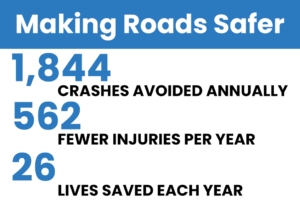
The FMCSA tracks HOS by requiring electronic logging devices (ELD). The ELD synchronizes with the engine to automatically record engine power status, vehicle motion status, miles driven, engine hours, driver identification and duty status.
Driver Vehicle Inspection Report (DVIR)
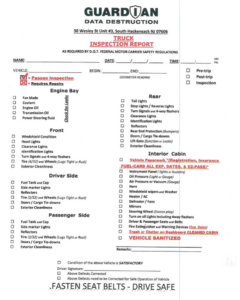
To prevent CSA violations, pre-trip and post-trip driver vehicle inspections must be done daily. At Guardian, DVIRs must be submitted daily with photo documentation. Our drivers are encouraged to do another DVIR at fuel, food and break stops to recheck securements and the truck.
The safety takeaway

At Guardian, we are committed to road safety.
- Customers want to know that their IT Assets are in good hands and will be delivered to the final destination safely, securely and on time.
- Customers want what they’ve paid for. If they’re working with a logistics provider that doesn’t have a good track record, the results will show.
- Poor safety records trigger more road inspections taking valuable time off the clock for everyone.
- Time spent in a truck inspection is work that isn’t completed, pickup and delivery schedules that are missed and possible HOS violations.
- We have an extensive, oft-repeated training program to help all Guardian drivers maintain their high levels of safety awareness and activity.
Commercial logistics safety compliance is a reliable evaluation metric for contracting out your highest-value IT asset: data.
To learn more about Guardian’s secure IT Packing and Logistics services, you can find our services here. Guardian has the largest fleet of mobile data destruction trucks distributed at 23 service hubs throughout the continental US.
Don’t have an ITAD, VAR or MSP who offers secure, white glove packing and logistics for your data center or IT assets? We can help you find the perfect fit. To learn more about how Guardian’s Core Values, Mission and Customer Promise can benefit your operation, contact us.


